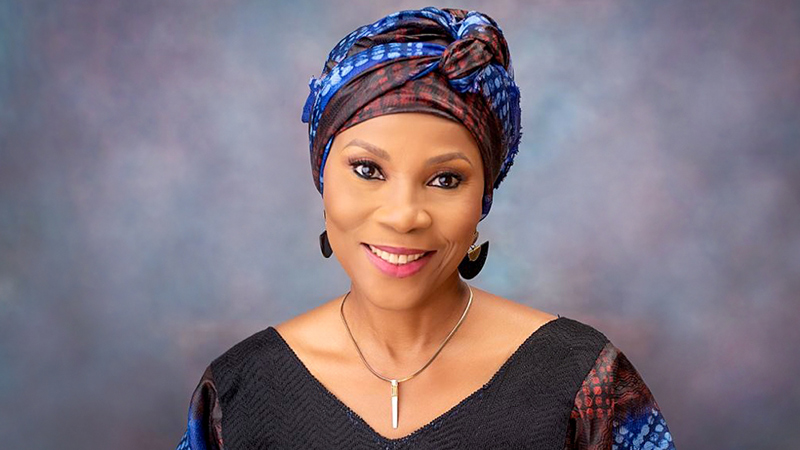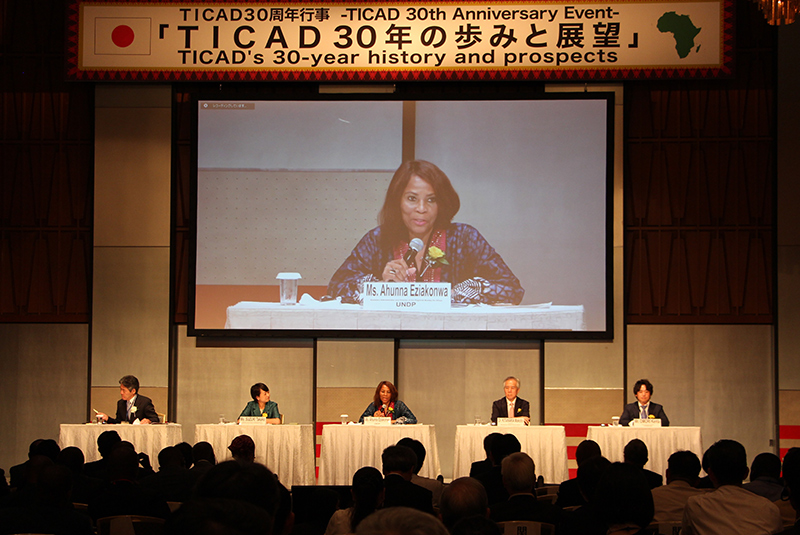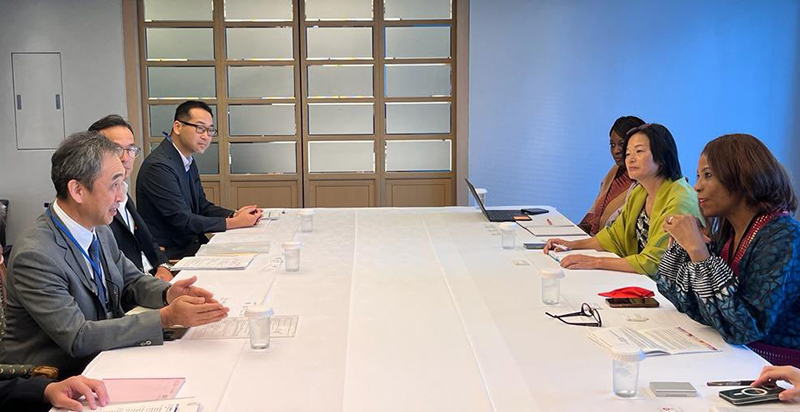[TICAD at 30] Co-creating Africa’s future: Interview with UNDP Assistant Administrator and Regional Director for Africa Ms. Ahunna Eziakonwa
2024.01.17
Through TICAD, Japan has been cooperating with various organizations to boost development in Africa. Particularly, the United Nations Development Programme (UNDP) has supported the TICAD process for many years. JICA interviewed Ms. Ahunna Eziakonwa, UNDP Assistant Administrator and Regional Director for Africa, about the current challenges facing Africa, the efforts made so far through the TICAD process, and her vision for Africa's future.

Ms. Ahunna Eziakonwa, UNDP Assistant Administrator and Regional Director for Africa
Just like other continents, the multiple crises such as the COVID-19 pandemic, the ongoing war in Ukraine and climate change, are heightening vulnerabilities in Africa. The main challenge is that, in spite of having many of the world’s most needed mineral and natural resources, Africa is too dependent on imports of key strategic inputs - food, energy and fertilizers. This needs to change if Africa is to own its development trajectory, and ensure that the continent’s rich human, agricultural, energy, maritime and mineral wealth delivers abundant, consistent, and sustainable development gains.
We are half-way to the 2030 deadline for the achievement of the Sustainable Development Goals (SDGs), but unfortunately, the world is only on track 15% of the SDGs targets. It is estimated that Africa needs about USD 1.3 trillion every year to meet the SDGs targets. The current world financial system makes it challenging for African countries to attract investment to accelerate SDGs. For example, at UNDP we recently highlighted how the distorted assessment of credit rating agencies on African countries’ creditworthiness has implications for investment in the SDGs.
Currently, credit ratings for most African economies are of speculative (non-investment) grade, except for two countries: Botswana and Mauritius. The “Lowering the Cost of Borrowing in Africa” report recently published details how more objective credit ratings could save up to $74.5 billion for African countries’ development. The results of the analysis show that the total price paid by African countries due to credit rating specificity is estimated at USD 28 billion in excess interest and USD 46 billion in lost financing. This calls for a revisit and reform of the architecture of development finance.
Africa, to me, is the richest continent in the world in three respects.
First and foremost, Africa’s most important wealth is its people. The continent is home to the youngest population in the world, with over 60 percent of its inhabitants under the age of 25. By 2050, it is estimated that about 25 percent of the world’s population will be from the African continent. Africa’s young population holds the key to our global future.
This is why at UNDP, youth are the spine of our development programming. For example, in partnership with the African Union Commission, UNDP launched the African Young Women Leaders Fellowship Programme – to catalyze creation of a corps of women leaders that can drive the continent’s development.
Second, Africa is a continent rich in various forms of natural wealth, including the biggest cobalt, diamonds, and uranium reserves in the world. For instance, the continent has about 60% of the world’s uncultivated arable land. Nearly half of Africa’s 55 countries possess verified natural gas reserves and approximately 40 percent of the world's recent gas discoveries in the past decade, have been concentrated in Africa, primarily in regions like Senegal, Mauritania, Mozambique, and Tanzania.
Capitalizing on its natural and human resources, Africa can leverage trade - critical to boosting economic growth. Although the continent only has 2 percent of all world trade, evidence shows that a 1 per cent increase in Africa’s share of world trade would generate about $70 billion of additional income annually for the continent, an amount that is three times the total development assistance it receives from the entire world.
The establishment of the African Continental Free Trade Area (AfCFTA) presents a distinctive opportunity for African countries integrate into global and international value chains. It is projected that the AfCFTA could lead to a 7 percent increase in income across the continent by the year 2035, contributing to the upliftment of approximately 40 million individuals from extreme poverty. This transformation is primarily anticipated through the stimulation of trade within the African region to enhance economic growth.
Third, the African continent is also very innovative. According to the African Development Bank, 22% of Africa's working-age population are starting businesses. This is the highest entrepreneurship rate in the world. This is why at UNDP, we continue to invest in African entrepreneurs and support them to continue to find new solutions to address the continent’s development challenges, such as through our new initiative called “timbuktoo”.

Left: Participating at AFRI CONVERSE #03 as a panelist. Right: With the African students after the session.
At the G7 earlier last year, Japan demonstrated its commitment to Africa and acknowledged the influence of Africa on the global economy. If we look at TICAD’s achievements, it has proven to be unique in that it is a continuous, African-owned forum, which is linked to many other global and regional frameworks including the Sustainable Development Goals.
TICAD has been instrumental in facilitating support and investment from Japan to Africa since the first conference in 1993. Promoting private sector development, technology transfer and institutional capacity building have also been key elements of TICAD. Knowledge sharing between Africa and Japan will remain as a key to the TICAD process, which includes sharing advanced tech expertise and environmentally sustainable solutions such as Japan’s Green Growth Initiative that promotes green economics and support to just energy transitions.
Envisioning the future of TICAD, it is important to retain the values that make TICAD unique in comparison to other development forums in Africa. I would like to emphasize the following five points:
Further, for the TICAD to be future-centric, we must incorporate and engage next generation at its full scope, with the support of skilling Africa’s youth to drive Africa’s industrialization, expanding vocational/technical training programs, increasing access to digital skills training and supporting youth entrepreneurship incubators.

Participating at TICAD 30th anniversary symposium as a panelist in August 2023.
JICA is one of Africa’s closest and most steadfast supporters in international development over the past three decades. JICA’s successful development story across Africa inspires change and transformation. Investment in people is at the core of Japan-Africa strategy as reassured during TICAD8. Entrepreneurship in Africa is experiencing a remarkable surge, fueled by a combination of factors such as a youthful population leading the charge in innovation, greater technological accessibility, and unwavering determination to challenge the existing norms.
However, a survey analysis of 427 women entrepreneurs in Africa shows that 70 percent of the survey respondents identified access to finance as the most significant barrier to starting their own business. This is where partners such as JICA and its private sector partners are expected to come in by capitalizing TICAD as a platform of public-private partnership.
I would like to refer to the recent meeting between the president of JICA and our Administrator held in September 2023. Both acknowledged that the private sector involvement is critical to development in Africa, and that strengthening the capacity of state institutions and human capital to attract private financing by the African governments/people are prerequisite for investment and business. In this connection, with new opportunities in Africa around the African Continental Free Trade Area (AfCFTA), JICA can work with UNDP to unlock opportunities to promote Made in Africa and Enterprise Africa revolution.
Africa’s youth are gearing up to maximize opportunities in the one African market – and we must support them to do this. It represents a major opportunity for trade and investment that the Japanese private sector should tap into. The continent remains home to the world’s youngest and fastest-growing population, emerging cities, and innovations in different domains such as fintech and clean energy. I hope JICA will continuously join in our journey for such transformation.

Ms. Eziakonwa, UNDP Assistant Administrator and Regional Director for Africa with Mr. Ando Senior Vice-President of JICA
African-owned development has three important dimensions.
The first is a reduction in dependency. We have to change the narrative of development from one of charity to development as an investment proposition. This would require a fairer international financial and trade architecture to allow Africa to attract investments in higher value-added industries.
Second, African countries must put systems in place to better manage its abundant natural resources. It is critical to improve frameworks of accountability in managing these resources and strengthen the ability of African countries to negotiate with the corporations that mine these resources, so that African people benefit more from African resources.
Third, African countries must invest more in young people – particularly relating to health care, education and technological skills. Africa is expected to have 460 million young people by 2050 , double its current numbers. To reap the benefits of this demographic dividend, we must improve the availability, affordability and quality of education in Africa. There is also a need to bridge the digital divide to equip these youths with the tools for the economy of the future. Currently only 43.2% of people on the continent have access to the internet, far below the global average of 67.9%.
I would like to reiterate that Africa is emerging as a vocal champion of multilateralism at the regional, continental, and global levels. This calls for the recognition of multilateralism’s integral role in accelerating development, prosperity, and peace. TICAD could mobilize international partners to work with the continent with a promise lens.
*Read more about UNDP’s Renewed Strategic Offer in Africa ( Africa’s promise) here
scroll